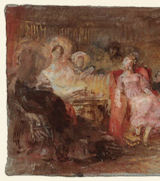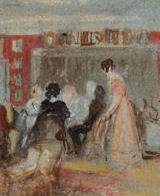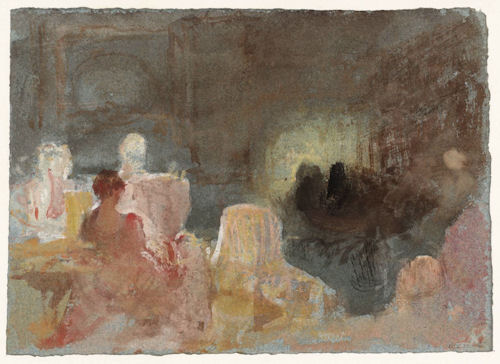




If the Novel's comparatively lengthy Chapter Three describing the Meryton Assembly forms one part of the Foundation, the entwining of the members of the Bennet family with the occupants of Netherfield in Chapters Four to Twelve inclusively furnish the remaining reinforcing foundational structure (Sir William and Lady Lucas and their daughter Charlotte having been part of the story from its earliest pages).
* * * * *
We don't really need Austen's more thorough discussion of the characters of Bingley and Darcy contained in Chapter Four, since the behaviour of both at the Meryton Assembly has already established that:
... Bingley was sure of being liked wherever he appeared; Darcy was continually giving offence.
But we are also favoured with Jane Austen at her caustic best in this chapter's description of the two Bingley sisters.
They were in fact very fine ladies ... but proud and conceited ... were in the habit of spending more than they ought, and of associating with people of rank; and were therefore in every respect entitled to think well of themselves, and meanly of others. They were of a respectable family in the north of England; a circumstance more deeply impressed on their memories than that their brother's fortune and their own had been acquired by trade.
(Mr. Hurst, husband of the eldest sister, has already been dismissed in Chapter Three's introduction of the Netherfield party as merely looking the gentleman.)
We learn that though Mr. Bingley was established only as a tenant at Netherfield,
Miss Bingley was by no means unwilling to preside at his table, nor was Mrs. Hurst, who had married a man of more fashion than fortune, less disposed to consider his house as her home when it suited her.
The sisters also allow that they admire and like Jane,
... and pronounced her to be a sweet girl ... whom they should not object to know more of ... and their brother felt authorised by such commendation to think of her as he chose.
* * * * *
The blossoming affection between Jane Bennet and Mr. Bingley is given due attention by Miss Austen, but shifted to the sidelines with the main focus on Mr. Darcy's increasing and reluctant attraction to Elizabeth, Austen's heroine.
Occupied in observing Mr. Bingley's attentions to her sister, Elizabeth was far from suspecting that she was herself becoming an object of some interest in the eyes of his friend. Mr. Darcy had at first scarcely allowed her to be pretty; he had looked at her without admiration at the ball ... But no sooner had he made it clear to himself and his friends that she had hardly a good feature in her face, than he began to find it was rendered uncommonly intelligent by the beautiful expression of her dark eyes ...
He began to wish to know more of her ... [Chapter Six]
By Chapter Ten, at Netherfield, he is inquiring if she does not feel a great inclination to dance a reel; she smiles, but makes no answer. He repeats the question.
'You wanted me, I know, to say 'Yes',' she replies, 'that you might have the pleasure of despising my taste ... I have therefore made up my mind to tell you that I do not want to dance a reel at all — and now despise me if you dare.' 'Indeed I do not dare,' he counters.
Elizabeth, having rather expected to affront him, was amazed at his gallantry; but there was a mixture of sweetness and archness in her manner which made it difficult for her to affront anybody; and Darcy had never been so bewitched by any woman as he was by her. He really believed, that were it not for the inferiority of her connections, he should be in some danger.
'Sweetness and archness'. It is a fact that many authors fail to offer convincing proof that their heroes own all the virtues and accomplishments attributed to them, so that we find ourselves secretly cheering instead for the other side, or best friend, the straying wife, or husband or anyone but the tiresomely perfect main character. But readers (and viewers, too, when permitted) who for two centuries have been enchanted by Elizabeth Bennet's grace and wit and charm, show every sign of willingness to continue for another couple of hundred years to allow themselves, together with the helpless and reluctant Mr. Darcy, to be 'caught by the easy playfulness' of her manners.
How can we not be, with a scene like the following, after Jane has described Mr. Bingley as:
'... just what a young man ought to be ... Sensible, good humoured, lively ...' 'He is also handsome,' replied Elizabeth, 'which a young man ought likewise to be, if he possibly can ... Well, he is certainly very agreeable, and I give you leave to like him. You have liked many a stupider person.' [Chapter Four]
We admire also Elizabeth's unshakable belief that she is as good as any Bingley, or Darcy, no matter that their fortunes are immense, while her prospects, as well as those of her sisters, are precarious indeed, with an uncle who is:
'... an attorney in Meryton, and another, who lives somewhere near Cheapside,' in the dismissive words of the Bingley sisters.
'If they had uncles enough to fill all Cheapside,' cries the estimable Mr. Bingley,'it would not make them one jot less agreeable.' '...But it must very materially lessen their chance of marrying men of any consideration in the world,' replies Darcy. To this speech Bingley made no answer, but his sisters gave it their hearty assent ... [Chapter Eight]
There is another reason for our affection, one that is seldom remarked amongst female protagonists. In a scene at Netherfield, Bingley assures Elizabeth that:
'... I declare I do not know a more aweful object than Darcy, on particular occasions, and in particular places; at his own house especially, and of a Sunday evening when he has nothing to do.' Mr Darcy smiled; but Elizabeth thought she could perceive that he was rather offended; and therefore checked her laugh. [Chapter Ten.]
Elizabeth, in other words, has a sense of fair play. Whether Mr. Darcy deserves such forbearance is another matter.
* * * * *
Even though their role is necessarily somewhat curtailed, the Bennet parents continue to set the tone throughout these early chapters. Their exchanges — demonstrating the mother's headstrong obstinate foolishness, and the father's aloof implied criticism — form an essential dynamic in the action and outcome of the Novel, and to the extent that we believe its truthfulness, we accept the likelihood of one event leading inexorably to the next.
Mr. Bennet in Chapter Seven concerning the effusions of Kitty and Lydia in regard to the recent arrival in the neighbourhood of a militia regiment:—
'From all that I can collect by your manner of talking, you must be two of the silliest girls in the country. I have suspected it some time, but I am now convinced'.
And their mother's impassioned defence:
'I remember the time when I liked a red coat myself very well — and indeed, so I do still at my heart ... and I thought Colonel Forster looked very becoming the other night ... in his regimentals.'
With this example to guide them, why should the younger daughters feel any need to constrain their behaviour with an entire militia regiment encamped at Meryton?
Later in Chapter Seven, Miss Bingley sends an invitation for Jane to visit in the absence of the men at Netherfield. Disappointed at the lack of participation by Mr. Bingley in these plans, and demonstrating a disconcerting lack of maternal concern, Mrs. Bennet determines to send Jane outdoors on horseback,
'... because it seems likely to rain; and then you must stay all night.' Her hopes were answered; Jane had not been gone long before it rained hard ... Her mother was delighted. The rain continued the whole evening without intermission; Jane certainly could not come back.
Next morning Jane sends a note stating that she finds herself very unwell. We are no longer surprised by Mr. Bennet's ironic response:—
'Well, my dear ... If your daughter should have a dangerous fit of illness, and she should die, it would be a comfort to know that it was all in pursuit of Mr. Bingley, and under your orders.'
Mrs. Bennet is unrepentant. 'People do not die of little trifling colds. She will be taken good care of.'
She is less enthusiastic about Elizabeth setting out on foot three miles to see for herself how Jane is doing:
'How can you be so silly ... as to think of such a thing, in all this dirt! You will not be fit to be seen when you get there.'
Of course Mrs. Bennet will come to Netherfield in Chapter Nine, to visit Jane and do her best to prevent Jane's coming home, and of course she will cover herself with vainglory and her daughters, especially Elizabeth, with shame and mortification. And youngest daughters Lydia and Kitty will hold Mr. Bingley to his promise to hold a ball at Netherfield, when Jane is completely recovered.
* * * * *
Pictures 3A
Most Pictures on these Pride and Prejudice and other
Austen webpages, are from the
Turner Bequest of the Tate Museum Collection Online.
This particular webpage Foundation (2), Netherfield is so important to the story (and not incidentally to my architectural framework) that I've tried to choose the most beautiful Pictures available from the Turner Bequest of the Tate Museum Collection Online.
This Page Chapters 4 to 12:
Foundation (2), Netherfield, or Reinforcing the Framework
 JMW Turner, 1818
JMW Turner, 1818
Title: Farnley Hall from the East
Medium: Bodycolour and chalk on paper
Support: 311 x 394 mm
Private Collection, Turner Worldwide
Reference: TW0240, Wilton 587
 JMW Turner, 1827
JMW Turner, 1827
The Lady in Pink: Conversation in the White Library 1827
Medium: Gouache and watercolour on paper;
Dimensions: Support 141 x 194 mm
Collection: Tate, Accepted by the nation as part of the Turner Bequest 1856
View by appointment at Tate Britain's Prints
and Drawings Room
Reference D22688
 JMW Turner, 1827
JMW Turner, 1827
Music in the White Library 1827
Medium: Gouache and watercolour on paper;
Dimensions: Support 140 x 190 mm
Collection: Tate, Accepted by the nation as part of the Turner Bequest 1856
View by appointment at Tate Britain's Prints
and Drawings Room
Reference D22699
 JMW Turner, 1827
JMW Turner, 1827
Fire-light and Lamp-light 1827
Medium: Gouache and watercolour on paper;
Dimensions: Support 139 x 193 mm
Collection: Tate, Accepted by the nation as part of the Turner Bequest 1856
View by appointment at Tate Britain's Prints
and Drawings Room
Reference D22703
________________________